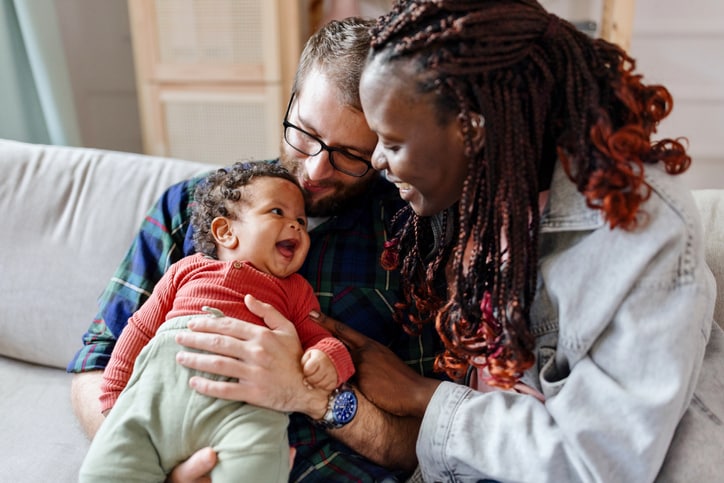It’s an occasion every parent looks forward to: hearing their baby laugh for the very first time. But when do babies start laughing? Lucky for mums and dads, a baby’s first laugh happens pretty early on. While it’ll be some time before your little one is chuckling at Phoebe Waller-Bridge’s latest series, laughing is generally a landmark babies hit before they’re 6 months old.
Generally, you can expect babies to start laughing when they’re about 4 months old, but the range for a baby’s first laugh is from 4 to 6 months.
We’ve gathered some expert tips for when parents can expect to hear their baby’s first laugh, along with suggestions for getting a happy little giggle.
When do babies start laughing?
On average, babies start laughing at around 4 months, but there are a few things that need to occur developmentally first. Some of the more social responsive milestones, like smiling and laughing, are a part of overall development. An infant’s first social smile can occur as early as 6 to 8 weeks. This is a responsive action that occurs when the infant is reacting in a positive manner, usually upon seeing a familiar face.
Laughing usually occurs one to two months after the social smile, and takes on varying degrees. Early chuckling can be seen at 4 months, whereas full laughing is one of those infant development stages that can be seen at 6 months. Laughing is a responsive social interaction, and it requires multiple systems.
Put another way: don’t expect a belly laugh right off the bat. Similar to other infant social development milestones, laughing starts off slowly and builds from there.
What makes babies laugh?
Laughing is a response to a positive stimulus, and typically one that’s unexpected. Imagine how a child would react if they looked at a dog, and it said “meow.” They’d probably crack up. With babies, it’s similar. Laughing often starts from a twist on what they were expecting, such as seeing their parent or carer make a silly face or hearing them talk in a silly voice.
The reverse is also true. If your baby looks at you and you suddenly make a mean face, they might cry.
After your baby has a few laughs under their belt, they may use it as a way to initiate communication with parents or loved ones. Plus — cuteness alert! — babies often respond to waking up in the morning with laughter.
How can you encourage your baby’s first laugh?
You’ll easily encourage your baby’s first laugh by being silly. Try sticking your tongue out, making a “fish face” or making a repetitive funny noise.
You can also encourage your baby to laugh simply by smiling — or laughing — when communicating with them. Copying behaviour is key, so performing the behaviour you would like to see is the best way to encourage smiling, chuckling and laughing.
Why do babies laugh in their sleep?
It can seem a bit strange the first few times you witness it, but it’s perfectly normal for babies to both laugh and smile in their sleep.
Babies can have reflexive laughs and smiles that present in the subconscious mind. Smiling and laughing while sleeping can be from the brain making neuronal connections while sleeping and is part of healthy childhood development.
When to check in with your paediatrician about laughter
So, look forward to this 6-month milestone, but if your baby isn’t smiling, chuckling or laughing by 6 months, bring it up with your paediatrician. That said, parents should discuss milestones and early childhood development at every health review.
Early childhood development and evaluating milestones are an important way for paediatricians and parents to determine if infants and children may benefit from more advanced assessments and evaluations for support such as occupational, physical and speech therapy.
If your baby isn’t yet laughing, it may just be that they haven’t yet reached that milestone, which comes towards the end of other infant social development milestones.
If babies have adequate input stimulation, they should be interacting with others by 6 months. That includes things like smiling and looking directly at you.
The bottom line on when babies start laughing
Odds are, your baby will start showing you their adorable laugh between 4 and 6 months. And while there are things you can do to encourage this impossibly sweet occasion, you needn’t become a full-time comedian.
Relax and enjoy your baby. How you instinctually interact with them is likely more than enough.
Parenting should be enjoyable. You don’t need to constantly look around for what you think you’re supposed to be doing. Do what you feel is best, and you’ll be doing right 99.9% of the time.
